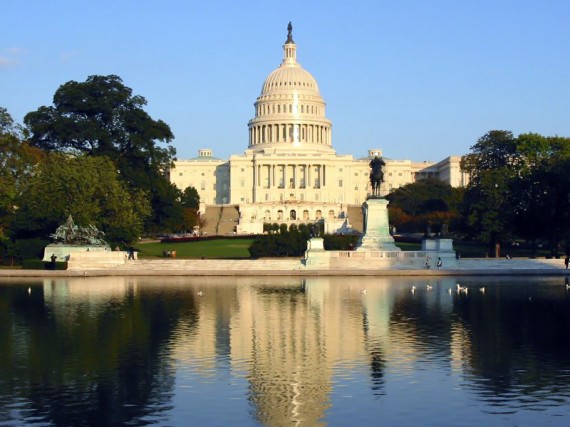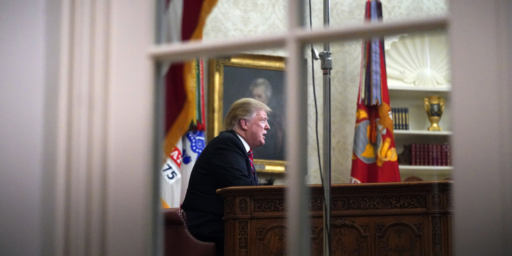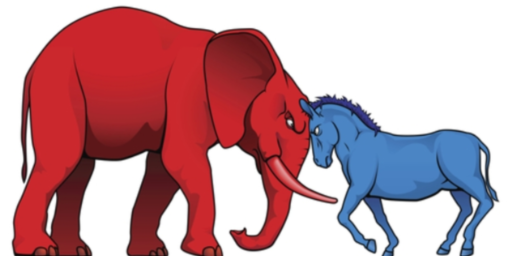If Everybody Hates Congress, Why Do They Keep Re-Electing The Same People?
Americans tell pollsters that hate Congress, but they never seem to do anything about it.
Hating Congress has been an American pastime since virtually the beginning of the Republic, but, as we’ve documented here at OTB many times in recent years, public dissatisfaction with what is supposed to be the people’s branch of the government seems to reach new highs each time the matter is polled. The latest example comes from the new NBC News/Wall Street Journal poll, which finds public dissatisfaction with Congress at a record high:
The American public’s dissatisfaction with Washington has reached new heights, according to the latest NBC News/Wall Street Journal poll, as the political world continues to fight the same intractable battles over the budget, health care and immigration.
A whopping 83 percent of Americans disapprove of Congress’ job, which is an all-time high in the survey. What’s more, President Barack Obama has seen his job-approval rating dip to its lowest level since August 2011, when the debt-ceiling showdown wounded almost every Washington politician.
And nearly six-in-10 voters say they would vote to defeat and replace every single member of Congress if they had such an option on their ballot another all-time high.
“There is a palpable unhappiness with Washington,” says Democratic pollster Peter D. Hart, who conducted this survey with Republican pollster Bill McInturff. “Outside the Beltway, voters are saying, ‘You don’t get it.'”
Democratic pollster Fred Yang, who partners with Hart, paraphrases from Shakespeare to describe the public’s mood: “Now is the summer of our discontent.”
The poll finds that dissatisfaction cuts across ideological lines, with Republicans, Democrats, and Independents all nearly equally frustrated with Congress but, not surprisingly, the reasons for their dissatisfaction are quite different:
Asked to explain their dissatisfaction, respondents cite (in order) partisanship and the inability of Congress to get things done, middle-class Americans being ignored and the Obama administration’s policies and leadership.
But there’s a stark political divide: Democrats and independents blame partisanship and congressional gridlock as their chief culprit, while Republicans blame the president.
Still, there are signs that Republicans are shouldering more of the blame for the situation in the nation’s capital: just 22 percent say they believe the GOP is interested in unifying the country in a bipartisan way, versus 45 percent who say the same about Obama.
And while 56 percent of Americans say they think congressional Republicans are too rigid in their dealings with the president, a plurality of GOP respondents say congressional Republicans are too quick to give in to Obama.
“In their mind, Republicans have been too quick to give in to Obama,” says McInturff, the GOP pollster, about the views of self-identified Republicans in the poll. “For the average Republican House member, he or she is more likely to be concerned about a primary than general election.”
Despite all the dissatisfaction, though, its unclear that there’s really much of a mood on the public for major change in whose in charge:
When asked what we should do about Congress, however, people’s answers are less clear. When asked whether they want the next Congress to be controlled by Republicans or Democrats, the answers were split right down the middle at 44 percent for each side. Fifty-seven percent say both that their own representative should step aside and that if they had the option on the ballot to replace every single member of Congress they would do it, another record high for both questions. Yet, when they were given a chance to make some changes in 2012, they basically passed. Just 23 House incumbents and only one Senator were defeated in the last election.
It’s unlikely that things will be any different in 2014 notwithstanding the level of public dissolution with Congress. Much of the reason for that has to do with gerrymandering, the decline in the number of swing districts in the House, and the historical fact that it is incredibly rare for the party controlling the White House to pick up seats in Congress in a 6th year midterm. Indeed, looking at the RealClearPolitics average at the moment, the Generic Congressional Ballot gives Democrats a slight 3.5% edge, which is fairly insignificant in the grand scheme of things. This is the reason that, to date, none of the major political forecasts are giving Democrats much of a shot at grabbing control of the House and many analysts are suggesting that Republicans may actually pick up a few House seats when the voters are all counted. At the same time, the odds of Republicans gaining control of the Senate, or at the very least significantly increasing the size of their caucus seem especially good at the moment.
So, what to make of all this dissatisfaction with Congress? As I’ve said many times before, some of this is obviously a reflection of historical disdain for Congress —- “hate Congress, love my Congressman’ as the old saying goes — so it’s perhaps not too surprising that we see historically high disapproval ratings for Congress as an institution while at the same time living in a world where incumbents in the House and Senate are re-elected at a 90% rate. It’s true that if you go back to 2006, three of the last four Congressional election cycles have, at least in some sense, been so-called “wave” elections that have resulted in shifts in both membership and party control in both Houses of Congress but, even in those years, the vast majority of Congressmen and Senators were re-elected. Clearly, the American people either don’t really mean it when they tell pollsters they disapprove of what Congress is doing, or they don’t really feel like doing anything about it. I’m not sure there’s any other conclusion one can reach.






Clearly, the American people either don’t really mean it when they tell pollsters they disapprove of what Congress is doing, or they don’t really feel like doing anything about it. I’m not sure there’s any other conclusion one can reach.
That they don’t like Congress generally, but they like their own representative.
Maybe they like their guy for his great constituent service and ability to bring home the bacon, and they hate the other guys for their parochialism and pork barrel spending.
As far as hating Congress generally, there is a strategy there, as longtime GOP Senate staffer Mike Lofgren pointed out a little while back:
My answers:
1) People hate congress for very different reasons. Dems & Dem-leaners see things very differently than GOPers/GOP-learners.
2) People tend to hate those other congresscritters, while not so much hating their own (not hating doesn’t mean liking, though). One man’s pork is another man’s bacon, yadda yadda.
3) The system is set up for elections won by the Less of two Evils, and there is a very powerful pro-incumbent bias. Gerrymandering is part of the puzzle. So is the obvious fact that even when you do throw the bums out, the new bums are typically not much better. I tend toward thinking the problem is largely systemic. Don’t hate the playa! Hate the game!
We all know on some level that congresscritters are whores, basically because they have to be. How many hours a day does the average cc spend fundraising (turning tricks)? Wasn’t it like half their day, every day? So of course we have contempt for them.
p.s. The data confirms that the GOP base wants even less compromise. I’m not surprised, but it’s good to see some data on it.
Because no one gets to vote for Congress as a whole, they only get to vote for three specific guys. People can like their three specific guys (and thus keep re-electing them) while still hating the other 532.
Basically, the incumbent gets all the support and money from the party. They win the primary and the voters are too afraid to stay home and simply let the person lose. Voters are short-sighted. If they really wanted that person gone then they would be patient. Let the other side have a term, point to their failures and run a better candidate the next time. It never happens. Your party/team will always beat you at Voting Booth Chicken.
When elections are essentially for sale to the highest bidder, the guy with the largest purse usually wins. Throw in the massive advantage of incumbency with respect to name recognition, and this shouldn’t surprise anybody.
From the Dems’ perspective, I’m starting to think that the best long term strategy for them to follow is to let these GOP led state legislatures continue to do what they are doing, with an eye towards allowing public discontent to fester in order to retake those legislatures in 2020.
Just in time for redistricting.
I want mine, but I don’t want you to have yours.
One sentence that explains it all.
@PJ:
Exactly. These people profess to hate government spending. What they mean is that they hate everybody elses government spending. They love their own.
Don’t believe me? Propose closing a military base or cutting Medicare, then sit back and watch the fireworks.
I have read an argument that the elimination of earmarking has actually made things worse, since there’s no longer an option to win someone over by adding in a small bit of pork/constituent service in service of the larger goal.
I’m not sure whether I agree or not, but it did stick with me.
Asked and answered.
So in majority D districts and states, the majority will continue to vote for opposition to R partisanship and obstruction; and in majority R districts and states the majority will continue to vote for the guy who opposes the prez, if not someone even more wingnut looney who promises to oppose the prez 1000 percent.
Basically, if government does something, Republicans have compromised too much. That’s the feeling I get.
@Stormy Dragon:
Not me. I hate them all, tho I do hate McCaskill a little less than the others, and a LOT less than Akin.
Look…
Washington isn’t working.
You can dance around it all you want and play your both sides do it game…but the reason it isn’t working is simple: Republicans.
They have spent decades becoming more and more and more extreme. Radical is not an understatement.
*Supply-side economics? It’s a crazy abstract theory. It should have been ridiculed by Conservatives not embraced.
*De-regulation? A robust regulatory system is crucial to the success of capitalism. But Republicans have spent decades trying to dismantle it.
*Republicans have piled on debt during the good times and now have spent the last several years slashing it in the bad…the exact opposite of what should happen in prudent governance. *Republicans launched a frigin’ war that they didn’t prepare for on the basis of trumped up and cherry-picked evidence.
The result of this extremeism is what you see today. The middle-class is languishing, Inequality is at it’s heights. The richest are paying less than ever to support a system that is in part responsible for every single one of their private fortunes….the most favorable environment for entreprenuers on the planet is based on public investment. Yet the Republicans do not want to make those investments any longer. Almost 2 million more Americans would be working today if we simply invested in the public sector at the same rate as President Reagan.
Americans are paying the price for Republican radicalism and extremeism. Period.
People like their Congress-persons…they just don’t like what Republicans are doing in Washington to sabotage the country.
@Tillman:
Unless it involves killing someone, than it is the proper role of gov’t.
For instance,
Let’s say I come to hate Joe Courtney (rep), Chris Murphy and Richard Blumenthal (senators).
What are my options likely to be? Replacing them with Republicans, most likely. Primary challenges are a possibility, and that’s one of the reasons I held my nose and actually declared a party affiliation. I do vote in primaries.
The phenomenon mentioned in the Original Post: Hate Congress, love my Congressman, is one example of a general, wider rule of — humm — call it ‘parochialism’, I guess. When polled on education, people usually say that the whole ‘education system’ is failing but that their local schools are fine. I think Scott Fitzgerald nailed it: “The test of a first rate intelligence is the ability to hold two opposing ideas in mind at the same time and still retain the ability to function.”
But, on the issue of Congress, I’d question the ‘first rate intelligence’ part.
@Rob in CT:
I think you buried your lede…
Congress serves the 1% of the 1% of all those politically active who bankroll the lion’s share of their campaigns. In that light, 17% approval is actually pretty impressive.
Just curious: are their numbers for whether independents and Democrats think the President is too quick to give into Congress? I would suspect they are similar. The problem isn’t so much that a plurality of Republicans thing the GOP gives in too much; the problem is that their actions are being driven by pleasing that base.
Sadly because some people are just plain stupid! Have no clue who or what they are voting for. Vote against their own best interests just to keep the party they belong to in power! Everyone hates Congress but few will have the guts to kick the useless pieces of crap out of office come 2014. Then the moaning and groaning can start all over again!
@Hal 10000: Exactly. And that base has been (for lack of a better term) poisoned by constant repetition in an echo chamber of the evils of government, of how government holds back the great engine of American prosperity.
I don’t harbor the view that the Tea Party or most conservatives are actively racist. I never bought into the idea that because Obama is black, people are less inclined to vote for him or cooperate with him. After all, the other primary candidate in ’08 was Hillary, and if circumstances were different they’d be labeled misogynist instead of racist. I think just the presence of a Democratic President, after eight years of Bush and decades of conservative media expansion, has focused their activism against an institution of the government in a way the founders never saw coming.
@HarvardLaw92: “Propose closing a military base or cutting Medicare, then sit back and watch the fireworks. ”
But that’s not government spending. That’s Freedom!
I admit this is sort of off-topic, but…
Vote count on the recent attempt to pull funding from the NSA’s telephone snooping program:
Republicans: 94 Ayes, 134 Nays
Democrats: 111 Ayes, 83 Nays
Amash amendment fails 205-217
Granted, it’s possible some of the Ayes voted that way b/c party leaderships were aware they had just enough votes to stop the thing.
At least I have reason *not* to hate my rep today. He did vote Aye.
There is a great deal more that I like about my Representatives than their ability to bring home the pork. Thinking it is all about pork is naïve outlook. If it was all about pork then it wouldn’t matter who was elected and what party they belong to since according to many of you they would all try to bring home the pork equally. According to many of you, there is no difference between Nancy Pelosi and Paul Ryan. That is foolish thinking.
Indeed…at least Pelosi doesn’t trash government, so it follows that she would think that using government to help her constituents is a good thing…meanwhile, Paul speaks out of both sides of his mouth, trashing government on the one hand and then shoveling government dollars to his district on the other…
Pelosi is using government to line her and her supporters’ pockets. Paul at least has put out plans to decrease government spending and limit government. Nancy wants to spend a great deal more and greatly expand government power.
There is nothing wrong with limiting spending then fighting for those limited dollars. There is something wrong with not limiting spending then fighting for all those dollars. At least you admit there is a difference between Representatives. However I suspect you will forget that when it is convenient to do so.
The answer to the main question is simple….
Voters are only a rather small subset of the American voter. The majority of the American people are far less leftist than the American voter. They don’t vote, because they feel they have nobody to vote for. Once you understand that, the rest comes easier.